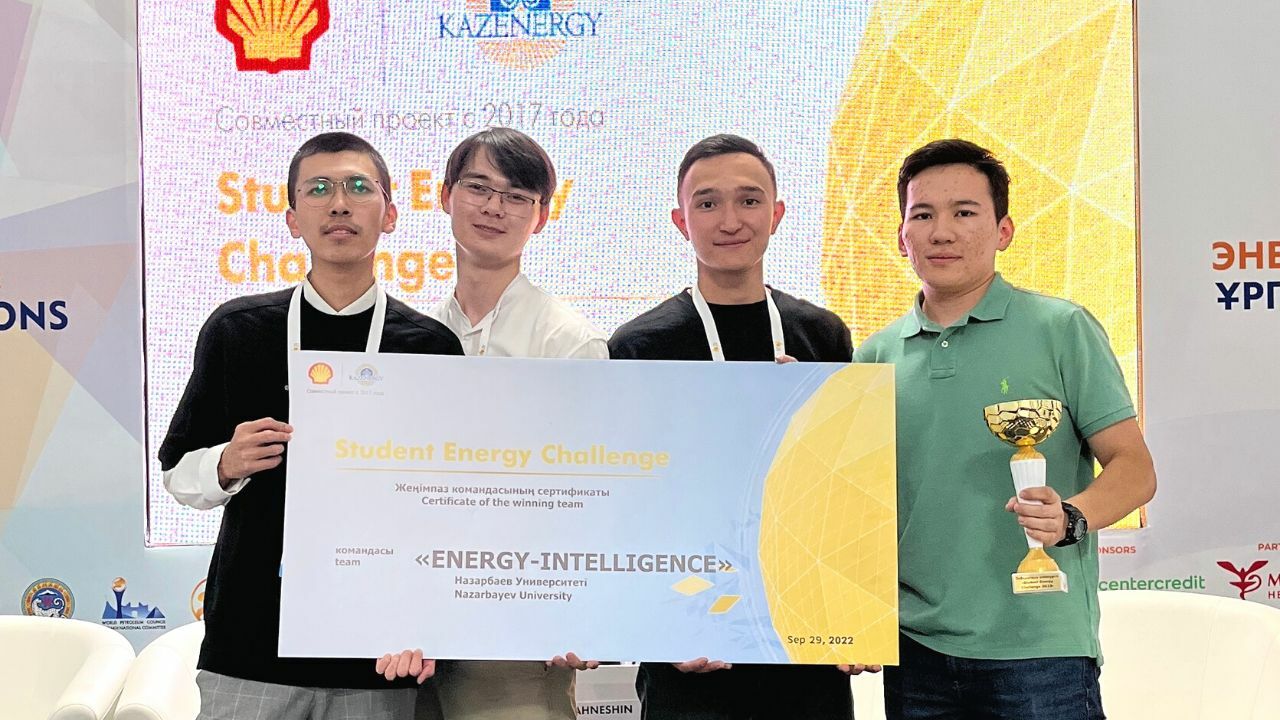Students of the School of Engineering and Digital Sciences of Nazarbayev University received funding of 4,000 USD. They became the winners of the National Student Energy Challenge-2022 competition as part of VII Youth Forum of the World Petroleum Council “Energy Transition: Dialogue of Generations” organized by the KAZENERGY Association on September 28-29, 2022, in Almaty.
The Energy-Intelligence team represented by 4th-year students of the Department of Electrical and Computer Engineering:
- Ali Almaganbet (team leader)
- Birzhan Kulmanov
- Ali Zhunis
- Zangar Ermaganbet
In this annual intellectual competition, “Student Energy Challenge,” students of technical universities in Kazakhstan compete by presenting projects and innovative ideas for solving energy problems.
The topic of the project is short-term and long-term forecasting of electricity consumption for efficient energy distribution and expansion of existing systems by using machine learning algorithms. Students from the Energy-Intelligence team noted that in case of successful implementation, the project could improve the energy system’s efficiency and ensure the country’s reliable and uninterrupted power supply.
Congratulations to the Energy-Intelligence team on this beautiful experience. We are confident that your projects will change the world!
ABSTRACT:Nowadays, being able to forecast electricity consumption is one of the crucial tasks in the electric power industry. The accurate consumption prediction saves energy resources and determines the efficiency of power management, making the entire energy system more stable and resilient to unexpected situations. The significant difference between electricity generation and consumption has environmental and economic consequences, such as environmental pollution during excess generation and purchasing electricity from neighboring countries at an unfavorable price in case of a shortage.
Currently, electricity consumption forecasting is carried out with the help of constant control and monitoring of electricity transmission. Experts make a forecast by analyzing historical data and doing manual calculations. Since this forecasting method requires the continuous presence of experts and can lead to substantial financial costs in case of unsuccessful analyses, there is a need to automate this process using digital technologies.
To prevent economic and environmental impacts, we have developed a project aiming to forecast electricity consumption for short and long periods accurately. Multiple data streams and machine learning techniques will be implemented to determine future electricity consumption.
To begin with, we determined the correlation between electricity consumption and the types of data available to us and identified the factors that affect consumption prediction. Studies have shown that historical consumption data, weather conditions, electricity prices, and the frequency of data indicators are essential parameters in forecasting.
Using these parameters as input to our algorithm, we get a short-term forecast, hourly and daily, for up to two weeks. Additionally, our project can provide long-term results considering economic and demographic factors such as the country’s GDP, population growth, and social conditions.
Short-term forecasting helps control the balancing of generation and consumption. In contrast, long-term forecasting creates the basis for effective solutions for updating and expanding the electric power system by determining the places where electricity consumption can potentially increase.
With the help of properly selected machine learning algorithms and neural networks, we can get forecasts of electricity consumption for the whole country, regions, and cities, which will significantly improve the operation of the power system.
In conclusion, in case of successful implementation, the project can improve the energy system’s efficiency and ensure reliable and uninterrupted power supply to the country.
Follow this link to watch a video to familiarize yourself with the student’s project.
